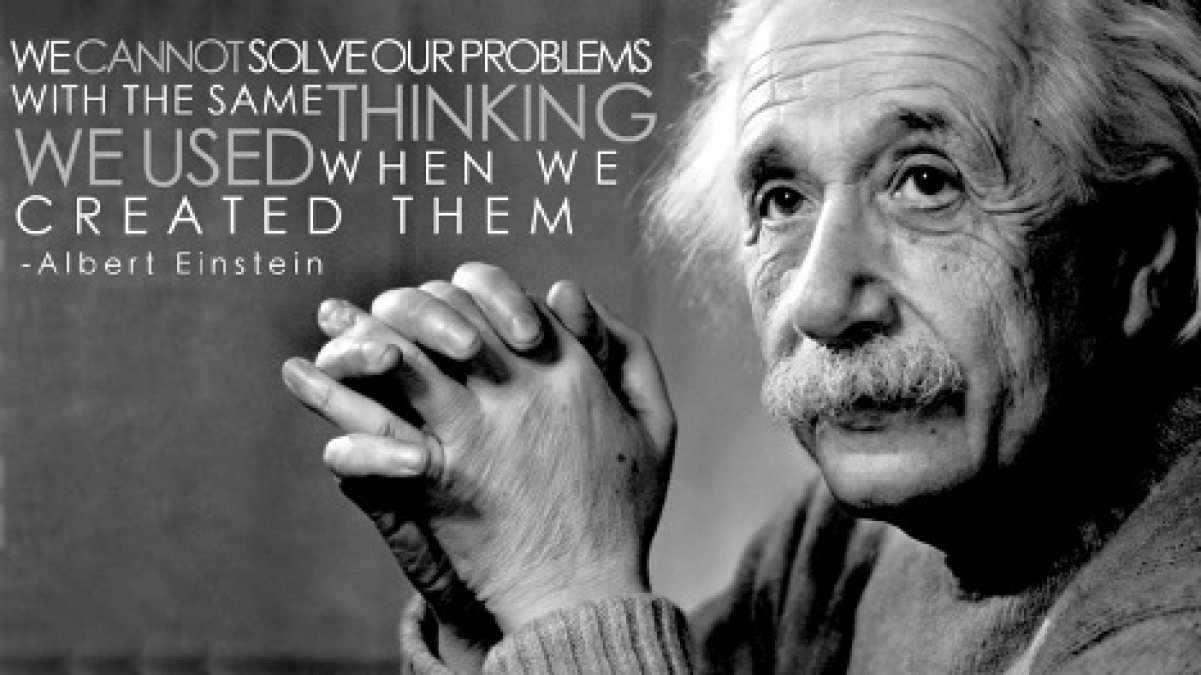‘We cannot solve a problem from the same level of thinking in which the problem was created’.
‘The quality of our lives is determined by the quality of questions we ask’.
What do all of these well-known phrases have in common? They all describe methods or patterns of thinking.
Have you ever thought about the way you engage your brain to approach a person, problem, situation or condition in your life? Most of us don’t analyze the process of our thinking or even ask ourselves why we react the way we do or how we formed the beliefs we have. We simply accept every thought we have as truth and allow those thoughts to determine our state of mind. In other words, a series of angry, worried, critical or insecure thoughts will deplete our energy and cause us to feel stressed and anxious, whereas a series of grateful, compassionate, kind, and enthusiastic thoughts enliven our senses and energize our minds and bodies. I say, why not choose the latter?
I can hear you saying, “If it were only that easy! We don’t choose our emotions, they come up naturally in response to life situations”! And my reply is simply, “You prove my point”! Your pattern of thinking is at the level of ‘cause and effect’, whereas you could be thinking from a new level of mind, which is ‘causing an effect’. Small change in words, big difference in your experience of reality. The former puts you on the receiving end of your life…feeling the effects of life happening to you, whereas the latter puts you in the driver’s seat where you are creating the results you wish to achieve – not by chance, but by careful use and direction of your greatest power – your thoughts!
So, let’s unpack this using the hypothetical circumstance that I haven’t beenoffered a promotion or any new opportunity after being in my job for 5 years.
A Cause and Effect mindset might lead me to feel frustrated, defeated, and insecure, and as a result put less and less effort into my job, get to work late, leave early, and collaborate less in meetings and other interactions with my boss and co-workers. This is the mindset that blocked a potential promotion or new opportunity.
A Causing an Effect mindset might lead me to think about how I could contribute in new ways to offer more value and as a result, I might put more effort into researching new practices, brainstorming with colleagues, finding new solutions to recurring challenges, etc. This would create a feeling of empowerment, confidence, and engagement and cause me to interact more effectively and collaboratively in the workplace. This is the mindset that lends itself to new opportunities and possibilities for promotion at work.
In the first example of ‘cause and effect’, my mindset is configured to believe that by receiving a result I don’t want, I have to react with a negative emotion. Bad circumstance = Bad response. Fair enough, but then you’re stuck.
In the second example, where I am literally causing an effect, my mindset is configured to believe that the result I don’t want is only temporary and can be resolved with a new level of thinking – one that challenges the status quo to go beyond the problem. Bad circumstance = an opportunity to challenge my thinking!
Now you are making progress! You begin to realize that YOU are causing the effect. Now this doesn’t mean you control every single thing that happens in your life, but it does mean that you can control your response to what happens, and that realization is your personal power/panacea.
In other words, if you don’t like a result, outcome, or experience in your life, you only need to take a short trip into the recesses of your gray matter to notice your own thought processes and make adjustments to expand your thinking. Challenge your current belief system and how you draw conclusions. Notice your internal “if-then” statements.
Ask yourself questions such as, “Is it really true that if I didn’t receive a promotion after 5 years that my boss is unfair or I am not good enough or this company has no new opportunities for me”?
You may also use the challenge questions, “What can I do to see this in a new way”? “What is the opportunity in this situation for me to grow”? “How can I turn this challenge into my greatest opportunity”? “What result would I like to experience and how would that feel”?
Once you set yourself upon a new thinking track you are headed for a new result. Just ask Albert Einstein, Thomas Edison, Nelson Mandela, or the Wright Brothers. They all knew that to create their desired outcomes, they had to use new ways of thinking that challenged the status quo. They were causing an effect and so can you.
But don’t take my word for it…give it a try and report back!
Rem voluptas et consequatur. Vitae magni rerum commodi dolorum aut. Quibusdam fugit vel pariatur ut Quos aut eos dolorem ullam nihil minima. A fugit dignissimos voluptatem aut quis nobis. Quo assumenda minima consectetur dicta hic qui. Labore perspiciatis eius id inventore. eos omnis assumenda doloremque et corporis. Sit neque fuga ea fugiat. Est voluptates quidem reprehenderit sit. At exercitationem deleniti non recusandae sint. In dicta a nam sequi deleniti A aut quod sunt quo aspernatur. Numquam totam et Iste illum cumque dolores laborum. aspernatur alias voluptatem adipisci eos. Asperiores voluptatem nihil aliquid quibusdam. Iste blanditiis velit officiis. et magnam incidunt id dolor.

